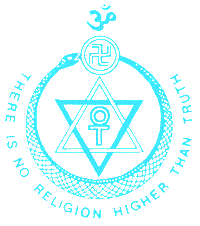KARMA

A Study in
Karma
by
Annie Besant
Published in
1917

Laws: Natural and Man-Made
Much
confusion has arisen in this matter, because, in the West, "natural"
laws have been regarded as apart from mental and moral laws, whereas mental and
moral laws are as much part of natural law as the laws of electricity, and all
laws are part of the order of nature. Natural law has been, in many minds,
confused with human law, and the arbitrariness of human legislation has been
imported into the realm of natural law. Laws affecting physical phenomena have
been rescued from this arbitrariness by science, but the mental and moral
worlds are still in the chaos of lawlessness.
Not a divine
command, but the immanence of the divine nature, conditions our existence, and
where prophets have laid down moral laws, these have been declarations of
inevitable sequences in the moral world, known to the prophet, unknown to his
ignorant hearers; because of their ignorance, his hearers have regarded his
declarations as arbitrary commands of a divine lawgiver, sent through him,
instead of as mere statements of fact concerning the succession of moral
phenomena in a region as orderly as the physical.
Law, in the
secondary social sense, is an enactment laid down by an authority regarded as
legitimate. It may be the edict of an autocrat, or the act of a legislative
assembly; in either case the force of the law depends on the recognition of the
authority which makes it. Among the Hindus we find the ideas both of man-made
and natural law. The King, in the conception of the Manu, is an autocrat, and
the subject must obey; but above the King is a Law to which he in his turn must
be obedient, a Law which acts automatically and is in the nature of things. In
spite of his autocracy, he is bound by the supreme Law, which will
crush him if
he disregards it. Weakness oppressed is said to be the most fatal enemy of
Kings; the tears of the weak sap the foundation of thrones, and the suffering
of the nation destroys the ruler.
The physical
and the super-physical worlds interpenetrate each other, and causes set going
in the one bring about results in the other. The King and his Council in
ancient
natural law.
It seems a
pity that one word should be used for two things so different as natural and
artificial laws, yet they are clearly distinguishable by their characteristics.
Artificial laws are changeable; those who make them can alter them or repeal
them. Natural laws are unchanging; they cannot be altered nor repealed, but lie
in the nature of things. Artificial laws are
local, while
natural are universal. The law in any country against robbery may be enforced
by any penalty chosen by the legislator; sometimes the hand is cut off,
sometimes the thief is sent to goal, sometimes he is hanged. Moreover, the
infliction of the penalty is dependent on the discovery of the crime. A penalty
which is
variable and artificial, and which may be escaped, is obviously not causally
related to the crime it punishes. A natural law has no penalty, but one condition
follows invariably on another; if a man steals, his nature becomes more
thievish, the tendency to dishonesty is increased, and the difficulty of
being honest
becomes greater; this consequence works in every case, in all countries; and
the knowledge or ignorance of others as to theft makes no difference in the
consequence. A penalty which is local, variable and escapable is a sign that
the law is artificial, and not natural. A natural law is a sequence of
conditions; such a condition being present, such another condition will
invariably fellow. If you want to bring about condition No.2, you must find or
make condition No.1, and then condition No.2 will follow as an invariable
consequence. These sequences never vary when left to themselves, but if a new
condition is
introduced the succeeding condition will be altered.
Thus water
runs down a slanting channel in accordance with the force of gravitation, and
if you pour water in at the top, it will invariably run down the slope; but you
can obstruct the flow by putting an obstacle in the way, and then the
resistance which the obstacle opposes to the force of gravitation balances it,
but the force of gravitation remains active and is found in the pressure on the
obstacle.
The first
condition is called the cause, the resulting condition the
effect, and
the same cause always brings about the same effect, provided no other cause is
introduced; in the latter case, the effect is the resultant of both.
______________________
KARMA

Find out
more about
Theosophy with
these links

The Cardiff Theosophical Society Website
The National Wales Theosophy Website
If you
run a Theosophy Group, please feel free
to use
any of the material on this site
The Most Basic Theosophy
Website in the Universe
A quick overview of Theosophy
and the Theosophical Society
If you run a Theosophy Group you
can use this as an introductory handout.
Theosophy Cardiff’s Instant Guide
One liners and quick explanations
H P Blavatsky is
usually the only
Theosophist that
most people have ever
heard of. Let’s
put that right
The Voice of the Silence Website
An Independent Theosophical Republic
Links to Free Online Theosophy
Study Resources; Courses,
Writings,
The main criteria
for the inclusion of
links on this
site is that they have some
relationship
(however tenuous) to Theosophy
and are
lightweight, amusing or entertaining.
Topics include
Quantum Theory and Socks,
Dick Dastardly and Legendary Blues Singers.
A selection of
articles on Reincarnation
Provided in
response to the large
number of
enquiries we receive at
Cardiff
Theosophical Society on this subject
The Voice of the Silence Website
This is for everyone, you don’t have
to live
in Wales to make good use of this
Website
No
Aardvarks were harmed in the
The Spiritual Home of Urban Theosophy
The Earth Base for Evolutionary Theosophy
A B C D EFG H IJ KL M N OP QR S T UV WXYZ
Complete Theosophical Glossary in Plain Text Format
1.22MB
________________
Preface
Theosophy and the Masters General Principles
The Earth Chain Body and Astral Body Kama – Desire
Manas Of Reincarnation Reincarnation Continued
Karma Kama Loka
Devachan
Cycles
Arguments Supporting Reincarnation
Differentiation Of Species Missing Links
Psychic Laws, Forces, and Phenomena
Psychic Phenomena and Spiritualism
Quick
Explanations with Links to More Detailed Info
What is Theosophy ? Theosophy Defined (More Detail)
Three Fundamental Propositions Key Concepts of Theosophy
Cosmogenesis
Anthropogenesis
Root Races
Karma
Ascended Masters After Death States Reincarnation
The Seven Principles of Man Helena Petrovna Blavatsky
Colonel Henry Steel Olcott William Quan Judge
The Start of the Theosophical Society
History of the Theosophical Society
Theosophical Society Presidents
History of the Theosophical Society in Wales
The Three Objectives of the Theosophical Society
Explanation of the Theosophical Society Emblem
Glossaries of Theosophical Terms
An Outstanding
Introduction to Theosophy
By a student of
Katherine Tingley
Elementary Theosophy Who is the Man? Body and Soul
Body, Soul and Spirit Reincarnation Karma
Quotes
from the Writings of
Helena
Petrovna Blavatsky
The Secret Doctrine , Volume 2, Page 100
It is only by the
attractive force of the contrasts that the two opposites — Spirit and Matter — can be cemented
together on Earth, and, smelted in the fire of self-conscious experience and suffering, find
themselves wedded in Eternity.
The Secret Doctrine , Volume 2, Page 108
It is the motive,
and the motive alone, which makes any exercise of power become black, malignant, or white,
beneficent Magic. It is impossible to employ spiritual forces if there is the
slightest tinge of selfishness remaining in the operator .... The powers and
forces of animal nature can equally be used by the selfish and revengeful, as
by the unselfish and the all-forgiving; the powers and forces of spirit lend
themselves only to the perfectly pure in heart — and this is Divine Magic.
Isis Unveiled,
Volume 1, Page 36
The Secret Doctrine , Volume 3, Page 14
Even ignorance is better than
Head-learning with no Soul-wisdom to illuminate and guide it.
The Voice of the Silence, Page 43
Annotation - The Path, May, 1888
The Secret Doctrine , Proem [Volume 1], Page 35
Isis Unveiled, Volume 1, Page 210
The Secret Doctrine , Volume 1, Page 134
incarnation of his
God; and when the sense of personal responsibility will be so
Isis Unveiled,
Volume 2, Page 374
It is the motive,
and the motive alone, which makes any exercise of power become
The Secret Doctrine , Volume 2, Page 498
Isis Unveiled, Volume 1, Page 36
From strength to
strength, from the beauty and perfection of one plane to the
greater beauty and
perfection of another, with accessions of new glory, of fresh
knowledge and power
in each cycle, such is the destiny of every Ego, which thus
becomes its own
saviour in each world and incarnation.
The Key to
Theosophy, Page 105
Try
these if you are looking for a local
Theosophy
Group or Centre
UK Listing of Theosophical Groups